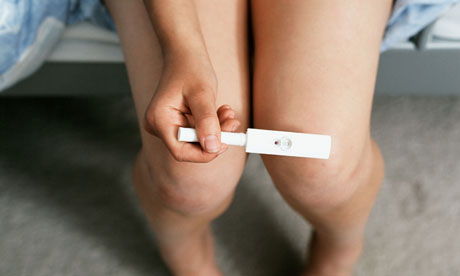
State officials in Louisiana have ordered a school to change a policy that forces students who are "suspected" of being pregnant to take a pregnancy test, and for banning them from class if the results are confirmed.
Civil liberties campaigners highlighted the policy at the Delhi Charter School, saying it was discriminatory and unconstitutional. Commentators expressed concern that any student merely "suspected" of being pregnant could be forced to take a test.
State officials ordered the school to change its policy within a week or face sanction. "We request that you immediately revise your policy," the Louisiana state department of education said in a statement on Tuesday night.
The edict followed a complaint from the American Civil Liberties Union which highlighted the case, saying the state-funded school was breaking the law. "This is in blatant violation of federal law and the US constitution."
According to the school manual's "student pregnancy policy", students suspected of being pregnant must be tested. Those who test positive "will not be permitted to attend class on the campus" and instead be required to study at home. "Any student who is suspected of being pregnant and who refuses to submit to a pregnancy test shall be treated as a pregnant student and will be offered home study opportunities. If home study opportunities are not acceptable, the student will be counseled to seek other educational opportunities."
Marjorie Esman, executive director of the ACLU, said in a letter the policy violated the Education Amendments and Equal Protection Clause by excluding students from class on the basis of sex. The manual says nothing about male students who father children.
"What a school should do is treat pregnancy as any other medical condition and allow the student to participate fully in anything that she's medically capable of participating in," said Esman's letter.
The policy presumed a pregnant student was unable to continue to attend class and violated the right to procreate and to decide whether to continue or terminate a pregnancy, she said. It also perpetuated "the archaic and pernicious stereotype that a girl's pregnancy sets a 'bad example' for her peers".
The school did not immediately respond to a Guardian interview request on Wednesday but earlier in a statement to the Daily News the principal, Chris Broussard, said the school had contracted lawyers to help review its policy.
"There have never been any complaints from students or parents about the school's policy. However, in light of the recent inquiry, the current policy has been forwarded to the law firm of Davenport, Files & Kelly in Monroe, La., to ensure that necessary revisions are made so that our school is in full compliance with the constitutional law."
The ACLU noted that around 70% of teenage girls who gave birth left school, partly because of illegal discrimination. "Schools should be supporting pregnant and parenting teens that face numerous barriers to completing their education, not illegally excluding them from school."
Another policy in the school's 216-page manual which caught attention was "reasonable corporal punishment of unruly students", defined as "paddling of the student's buttocks".
Public displays of affection were banned because they showed "disdain for good taste". Such displays included "holding hands on school premises, hugging, kissing, leaning against each other and sitting in each others' laps".

